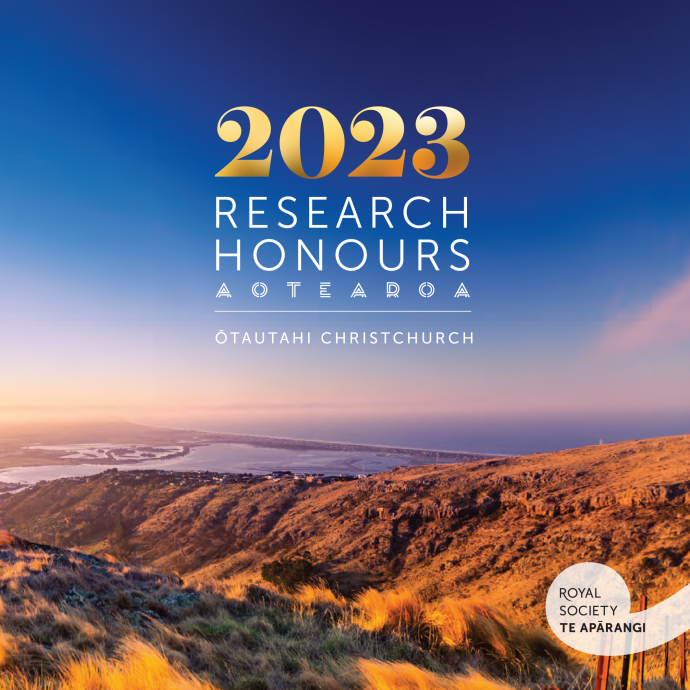News
Published 15 November 2023Ōtautahi Christchurch event to celebrate 2023 Research Honours Aotearoa winners

Four medals and awards were presented in Ōtautahi Christchurch this evening by Royal Society Te Apārangi to recognise researchers in New Zealand who have achieved excellence in scholarship, innovation or who have made a significant contribution to Aotearoa through their research and career.
This was the second of three 2023 Research Honours Aotearoa events to be held around the country.
It included a presentation from Kaitlyn Martin, a lecturer in STEM Education at University of Canterbury, who was selected by Royal Society Te Apārangi to be one of 22 Kiwis on the Inspiring Explorers Expedition™ to South Georgia, organised by the Antarctic Heritage Trust.
Guests also heard from Society Companion Hon Margaret Austin CNZM CRSNZ—a notable Cantabrian and former Minister of Research, Science and Technology—who encouraged us to perform our civic duty. “All of us have a responsibility to ensure we have an informed public and that is only possible when we engage, share knowledge and contribute expertise gathered along the way.”
The awards ceremony also recognised the 150th anniversary of the University of Canterbury.
Academy Executive Committee Chair, Distinguished Professor Geoff Chase FRSNZ said the Society was delighted to be in Christchurch in the year that the University of Canterbury celebrates its 150th anniversary. “Nobel Laureate Lord Ernest Rutherford FRSNZ, after whom our most prestigious award is named, is but one of many esteemed graduates whose research and work is shaping our world.
“We are enormously proud of our winners and their outstanding achievements.”
THE WORLD’S FIRST LOW-METHANE SHEEP
An AgResearch team has been awarded the Pickering Medal for breeding sheep which emit less methane, and for determining the potential reduction of methane emissions if these sheep can be farmed throughout Aotearoa New Zealand.
AgResearch’s breakthrough has provided sheep farmers with a practical tool to help them lower emissions from their flocks and offers the world a scientific solution to reducing agricultural contributions to global greenhouse gases.
The ‘Low Methane Sheep Breeding Team' first developed technology and scientific protocols to effectively measure the gas output of individual animals, then identified genetic and microbiological markers of low methane production. Over more than a decade, they have used this information to select healthy sheep which not only emit less methane, but also produce high-quality meat and wool. They’ve worked closely with the sheep-farming industry to implement the breeding approach more widely.
This has been a global first for any species, with the opportunity to reproduce the success of the programme for other livestock and accelerate global efforts to mitigate anthropogenic climate change.
View more on the Pickering Medal winner.
USING HISTORY TO CONNECT NEW ZEALANDERS TO THEIR PAST
Dr Vincent O'Malley has been awarded the Humanities Aronui Medal for his contribution to the research, knowledge, and public understanding of New Zealand history, particularly of the New Zealand Wars and Māori-Pākehā relations throughout the nineteenth century.
Vincent has been at the forefront of efforts to ensure New Zealanders take ownership of their history.
He was prominent in the push to have New Zealand history taught in all schools, supporting the campaign started by Ōtorohanga College students in 2014.
His public engagement is backed by his scholarship, including several books on the New Zealand Wars.
View more on the Humanities Aronui Medal winner.
DISTINGUISHED CONTRIBUTIONS TO UNDERSTANDING OF ‘INDISTINGUISHABLE’ PARTICLES
Professor Niels Kjærgaard has been awarded the Hector Medal by Royal Society Te Apārangi for his outstanding contribution to the advancement of scientific understanding of fundamental particles, through experimental studies of atomic collisions and light-scattering using ultracold gases.
Niels is a Professor of Physics at the University of Otago, and a Principal Investigator of the Dodd-Walls Centre. His research group is focused on quantum scattering, studying how ultracold atoms collide and how they interact with light. This research has enabled better understanding of the collective properties and behaviour of atoms in extreme states in which their motion is dominated by quantum mechanics.
Since coming to the University of Otago in 2010, Niels has built an ultracold atom machine which uses powerful laser beams to create clouds of potassium and rubidium atoms at temperatures of less than a millionth of a degree above absolute zero.
He and his team have used this machine to study the scattering of light from atoms in these quantum gases, and the interactions between their atoms as they collide.
View more on the Hector Medal winner.
SUSTAINABLE CONSTRUCTION WITH LOW-CARBON CEMENT AND CARBON CAPTURE
Royal Society Te Apārangi has selected Dr Vineet Shah, of Callaghan Innovation, for the Cooper Award— the Early Career Research Excellence Award for Technology, Applied Sciences and Engineering— for transforming concrete waste into a sustainable low-carbon additive for cement.
Through his research, Vineet is focused on improving the sustainability of the construction industry.
His pioneering work on low-carbon cement contributes solutions to two globally significant challenges:
- that concrete is one of the largest contributors to carbon emissions, creating approximately 8% of carbon dioxide emissions, and
- that a massive and increasing amount of concrete waste goes to landfill annually.
Vineet’s research pioneers the use of concrete “fines” — finely crushed concrete produced when buildings are demolished— to replace cement in new construction. By recycling demolition waste using carbon dioxide, this process permanently captures carbon dioxide.
He has also worked on carbon capture and storage technology using a common magnesium-silicate mineral.
View more on the Cooper Award winner.
~
Additional 2023 Research Honours Aotearoa awards were presented in Auckland on Wednesday 8 November and will be presented on Thursday 23 November in Te Whanganui-a-tara Wellington.
